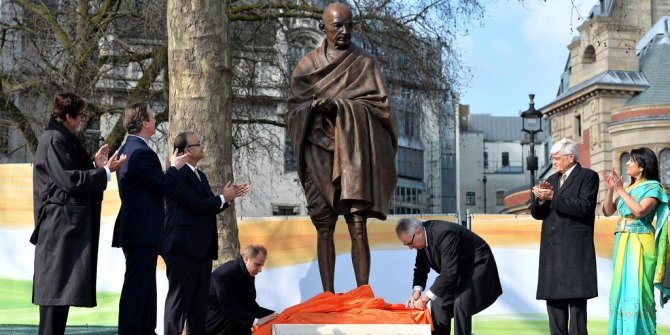
 Last Saturday, a new statue of Mahatma Gandhi was unveiled in Parliament Square. Here, Mukulika Banerjee offers a brief overview of the ceremony and Gopalkrishna Gandhi’s sensitive speech is posted in full.
Last Saturday, a new statue of Mahatma Gandhi was unveiled in Parliament Square. Here, Mukulika Banerjee offers a brief overview of the ceremony and Gopalkrishna Gandhi’s sensitive speech is posted in full.
On a sunny spring morning on 14th March 2015, as Big Ben struck half past ten, a short and beautifully orchestrated ceremony marked the unveiling of a statue of Gandhi in London’s Parliament Square. The speeches were very well done: by India’s Finance Minister Arun Jaitley, a beautifully read passage by the biggest living star of Indian cinema Amitab Bachchan, a fantastic one from Britain’s Prime Minister David Cameron (highlight: ‘this is a proud day for Britain to be able to honour Gandhi’) and an eloquent, profound one by Gandhi’s grandson and retired civil servant and diplomat Gopalkrishna Gandhi that addressed the ambivalence many feel about honouring Gandhi in a world full of arms deals and relentless violence.
Best of all, the statue when it was unveiled was beautiful in bronze and set on a low pedestal; the sculptor Philip Jackson has achieved a remarkable likeness to the Mahatma and the statue will no doubt become a must see attraction for visitors to London especially for the historic setting so full of irony and possibilities. Gandhi’s new neighbours are his old ‘friends’ Winston Churchill and Jan Smuts among many others including Nelson Mandela. Emertius Professor at LSE, Lord Meghnad Desai and his wife worked hard to raise the money for the statue that was achieved at the behest of the Cameron led government.

Gopalkrishna Gandhi’s speech
“He looked rather like this, sixty-eight years ago, to his assassin.
He looked straight into his eyes, quite exactly like this.
Gandhi was walking, of course, not standing. And he walked straight into those three bullets.
He embraced those darts, he did. With the might of his pain for others, the depth of his faith in God, he hugged them.
He had fought for years to prevent the division of India along the lines of religions.
But with that division a fact, he fasted for peace amongst the two main peoples of India – Hindus and Muslims – and for trust between the newly independent India and new-born Pakistan which included what now is Bangladesh.
Had he lived, he would have asked to have the man who shot at him freed. He had, as we know, been greatly influenced by Jesus, the Christ. Gandhi had just begun to dream to work for a new India that may or may not be rich, may or may not be powerful, but which will be fair and just, to its own poor, and to the immiserated everywhere.
He believed in learning from Truth – the one with the capital ‘T’ – and from the many truths of India, the truths that made her great, the truths that keep her small – and not running away from them, papering them over or prettifying them. Peace and its offering, happiness, can only come by acknowledging what I real. He said “the way of peace is the way to truth”.
Gandhi scorched by his love, he healed by his fire.
We need him in India today more than we ever have. He said there was so much he had left unfinished he would like to be re-born. But he would not want us to be looking out for the re-born Gandhi. In any case, that would be a loser’s way of doing things. Gandhi was no loser. India is no loser. India finds herself, from the debris of her mistakes, the ruins of her aspirations. Whenever she has been considered ‘lost’, she has been found by an astonished world, a relieved world, to be the mother of her greatest son, Gautama the Buddha in the composure that lies beneath the turbulence, and to the genius of her immensely wise and even sagacious people, of all faiths and of the other great faith – faith in their striving hands. I have used ‘she’ for India with deliberation for that ‘she’, the woman in India, worshipped in concept but neglected, exploited, abused in reality, is one of the scorching truths of India.
The fact that London, the capital of the then Imperial Power he dis-engaged India from, raises a statue for him even as India has some people contemplate a temple for his assassin, shows that Gandhi’s work for freedom of belief and expression succeeds in the most unbelievable ways.
You were not infallible Mohandas Gandhi. You erred often, as your wife, Kasturba, knew more than any other person. But you owned your errors, tried always to be better than your best. Bronzed and hearkening, here, in what once was your ‘opposite ground’, you will give heart to those who want a world that does not fear the bully, the bomb or the blatant lie. You will show us, too, that money cannot buy, nor power suborn, the truth.
On behalf of his ‘family’, which means not just his biological descendants alone – he did not elevate family descent – but all those anywhere who experience the tyranny of bigotry and exploitation and try to resist it, I felicitate Great Britain and Her Majesty’s Government for creating space for this Gandhi statue on this great Square. That large ‘family’ celebrates the fact of his statue taking its place right beside that of his political descendant, Nelson Mandela. How many countries celebrate the life-work of a man who opposed it with vehemence for more than three decades? Not many. Britain celebrates Gandhi today because while oppose he did, he opposed it in a cause that Britain now sees was just, and in a way the world now sees was fair – so fair as to have set an all-time example. On behalf of all present here today and the generations of pedestrians, young and once-young, from all nationalities and customs who will see it, I offer to Britain’s sense of history congratulations, her wisdom, appreciation. And to the master-sculptor of this statue, Philip Jackson, salutations.”
The speech is published with Gopalkrishna Gandhi’s permission.
Note: This article gives the views of the author, and not the position of the India at LSE blog, nor of the London School of Economics. Please read our comments policy before posting.
About the Authors
 Gopalkrishna Gandhi is the grandson of Mahatma Gandhi and an Indian civil servant and diplomat.
Gopalkrishna Gandhi is the grandson of Mahatma Gandhi and an Indian civil servant and diplomat.
Introduction by Mukulika Banerjee, Director-Designate LSE South Asia Centre and Associate Professor of Anthropology, LSE.







